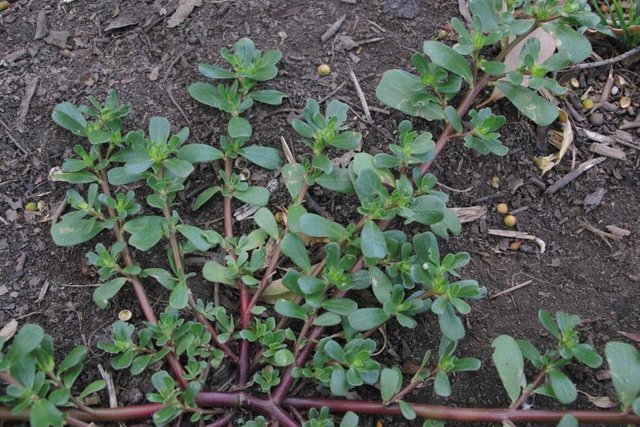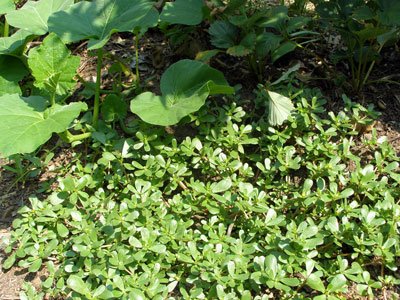PURSLANE: Good For Your Garden Plants and Your Health

Purslane is considered a weed, so why am I writing about intentionally putting a weed in your garden? That's because there are some weeds that are considered to be beneficial weeds. These are weeds that, used correctly, can affect the soil in ways that can benefit your garden. The benefits can vary depending of the weed, so lets look at what purslane can do for your garden.
Protect and Enrich Your Soil
A lot of people approach weeds as the enemy of gardening, and a weed is simply considered to be any plant that grows in your garden that you didn't put or want there. Weeds are either pulled out by hand or sprayed with chemicals until nothing but the wanted garden plants are left. Now, in gardening, exposed soil is a bad thing and most gardeners with any experience realize this. Exposed soil looses moisture easily, looses nutrients though erosion and it's beneficial living organisms are disrupted by the intense heat from direct sun exposure. Most gardeners add mulch after weeding, both to keep the weeds from coming back and to protect the soil. However, as good as mulch is, using a living ground cover has more benefits.

Purslane isn't the only plant you can use as a living ground cover, but its a pretty good one. Like most living ground cover, purslane stabilizes soil moisture, conserving water and keeping your garden healthier. Mulch does this as well, but purslane goes a lot further. It has very deep roots that reach nutrients and water that most garden plants can't access. So contrary to what most people believe a weed does, which is compete with your plants, purslane is one of many weeds that actually enriches the top layer of soil for your other garden plants. In addition to this, it breaks up hard soil, allowing other plants to develop a more established root system.
Eat The Ground Cover
The Purslane ground cover will lead to a healthier garden, which will increase your yields. But your vegetable yields will also go up when you consider that purslane is a delicious(it has a light lemony taste) and healthy green. What used to be bare soil, or soil covered in mulch, is now producing more food. Purslane is eaten in many parts of the world as a salad green and in cooking. It has an amazing nutrient profile. It has the highest content of omega-3 fatty acid of any leafy vegetable. It has 498 mg of potassium in a 100 gram serving(bananas have 358 mg). It is high in vitamin A , C and contains beta-cyanins and beta-xanthins, two potent antioxidants.
Purslane has about the same amount of oxalic acid as spinach. So you can eat about the same amount of it raw as you would spinach, but you should cook it for eating very large amounts. Just treat it the same as you would spinach.
Before you eat anything for the first time, always eat just a bit. Purslane is completely edible, but so are many other things that some people have allergic reactions to.
Link to long list of beneficial weeds
https://en.wikipedia.org/wiki/List_of_beneficial_weeds
Link to purslane nutrition
http://nutritiondata.self.com/facts/vegetables-and-vegetable-products/2604/2
Good to know. I've got a lot of this weed growing around.
I'm getting more into aquaponics than traditional gardening, but this sounds like something you could just plant in a small area as something to feed your fish, to add potassium to your system.
Love purslane! It grows wild my garden and I love juicing small amounts, and putting it in salads. This was a very informative post, thanks!
I feel the same way, and the flowers are really beautiful.
I've grown purslane for 2 years in my herb garden. Makes a nice contrast as it's got the fleshy leaves.
A wide range of affordable artificial grass & synthetic grass, astro turf, boxwood hedging & installation tools delivered throughout the UK!